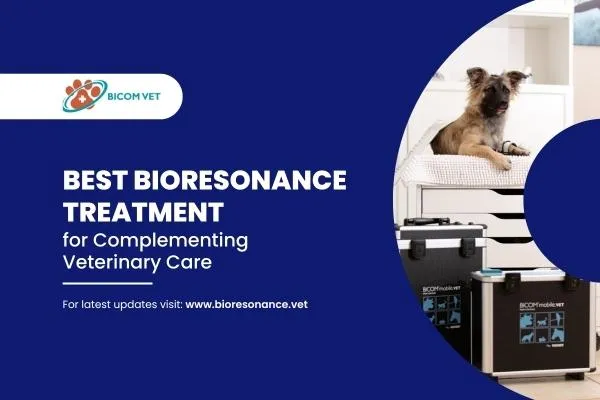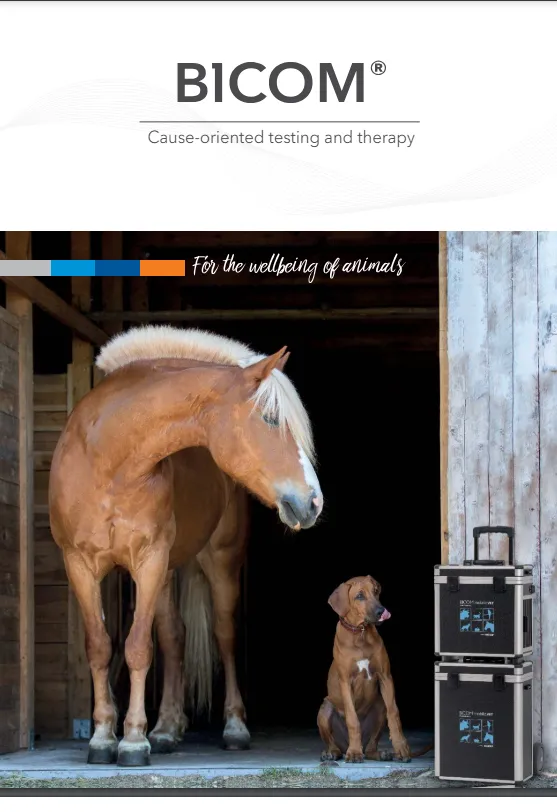BICOM® Bioresonance
Stress-free for pets and pet owners Suitable for all types of animals
There are many dogs , cats and horses suffering from health problems worldwide.
Be it problems with the musculoskeletal system, allergies and food intolerances or chronic diseases.
Sometimes, as an animal owner, you are at a loss when you can’t get any further with conventional therapy methods.
Like acupuncture or homeopathy, bioresonance belongs to the field of complementary medicine and is intended to be a useful supplement to conventional medicine.
It works with the body’s own wavelength of the four-legged friend, is used without medication and is painless to use.
Of course, not all health problems can be resolved with bioresonance. It is best to talk to a veterinarian or animal naturopath.
With our therapist finder you can find the nearest practice that can offer you BICOM® bioresonance.
Pain-free testing and therapy
Treatment with the BICOM® device is painless and stress-free. Especially sensitive animals feel very comfortable and it often happens that they completely relax and come to rest during the therapy.
Bioresonance has no harmful side effects and is used without medication.
Occasionally, initial aggravations, in what is known as the body’s initial reaction, can occur. However, these fade away after a short time.
What Pet Owners are saying..

How Bioresonance Treatment Can Complement Traditional Veterinary Care
How Bioresonance Treatment Can Complement Traditional Veterinary Care
Veterinary care is crucial in maintaining and improving the health of our pets. Traditional veterinary treatments, such as medications, surgeries, and vaccinations, are the standard methods for managing various pet health issues. However, these treatments can sometimes be intense, and their effectiveness may vary depending on the condition and the pet. This has led to a growing interest in complementary therapies that can work alongside conventional veterinary care. One such complementary approach is bioresonance therapy. In this blog, we will explore how bioresonance treatment can complement traditional veterinary care, enhancing its effectiveness and supporting pets' overall well-being.
What Is Bioresonance Therapy?
Bioresonance therapy is a non-invasive, energy-based treatment that operates on the principle that every cell in the body emits electromagnetic frequencies. When the body is affected by illness, stress, or toxins, these frequencies can become disrupted. Bioresonance aims to detect these disruptions and restore the body's natural frequencies, promoting self-healing and balance.
The therapy uses a device to measure the body's frequencies and identify any imbalances. Once identified, the device emits corrective frequencies to counteract these disruptions. This process is believed to help the body regain its natural rhythm, potentially improving overall health and supporting other veterinary treatments.
Enhancing the Effectiveness of Traditional Veterinary Treatments
Traditional veterinary treatments, such as medications and surgeries, are designed to target and manage specific health issues in pets. However, these treatments can sometimes have side effects or may not be fully effective on their own. Bioresonance therapy can complement these treatments by enhancing their effectiveness in several ways:
Supporting Cellular Health: Bioresonance therapy helps restore the natural frequencies of healthy cells, making them more resilient to the side effects of traditional treatments. This can lead to better tolerance of treatments and may improve their effectiveness in addressing the primary health issue.
Targeting Health Issues: Bioresonance therapy can be designed to target specific frequencies associated with health issues in pets. By doing so, it may help support the body's response to traditional treatments, potentially enhancing their overall impact.
Reducing Treatment Resistance: Sometimes, pets may develop resistance to certain treatments. Bioresonance therapy may help reduce this resistance by restoring the body's natural balance, allowing traditional treatments to work more effectively.
Reducing Side Effects of Traditional Veterinary Treatments
One of the major challenges of traditional veterinary treatments is the side effects they can cause. Bioresonance therapy can play a significant role in alleviating these side effects, making the treatment process more manageable for pets:
Managing Nausea and Vomiting: Traditional treatments often cause nausea and vomiting in pets. Bioresonance therapy can help balance the body's electromagnetic fields, which may reduce the severity of these symptoms.
Improving Energy Levels: Fatigue is a common side effect of various treatments. Bioresonance therapy can help boost energy levels by restoring cellular balance, allowing pets to better cope with their treatment regimen.
Protecting Organ Function: Some treatments can damage healthy organs. Bioresonance therapy can support organ function by ensuring that the body's natural frequencies are maintained, potentially reducing the risk of organ damage.
Promoting Detoxification: Traditional treatments can introduce toxins into the body. Bioresonance therapy can aid in the detoxification process, helping pets eliminate harmful substances more effectively.
Supporting Emotional and Mental Well-being
The emotional and mental challenges of undergoing veterinary treatments can be overwhelming for pets. Bioresonance therapy can complement traditional care by supporting pets' emotional and mental well-being in several ways:
Reducing Anxiety and Stress: Bioresonance therapy can help balance the body's frequencies, leading to a calming effect on the nervous system. This can reduce feelings of anxiety and stress in pets.
Improving Sleep Quality: Sleep disturbances are common in pets undergoing treatment. Bioresonance therapy can help regulate sleep patterns by restoring the body's natural rhythms, improving overall well-being.
Enhancing Mood and Behavior: Behavioral changes are not uncommon during treatments. Bioresonance therapy can help improve mood and behavior by ensuring that the body's frequencies are in harmony.
Promoting Recovery and Long-term Health
Bioresonance therapy can also play a crucial role in the recovery process after traditional veterinary treatments. It can support this phase by promoting recovery and long-term health:
Restoring Balance Post-Treatment: After treatment, the body may be left in a state of imbalance. Bioresonance therapy can help restore the body's natural frequencies, aiding in recovery and helping pets regain strength and vitality.
Supporting Immune Function: A strong immune system is essential for maintaining overall health. Bioresonance therapy can help strengthen the immune system by aligning the body's frequencies.
Aiding in Detoxification: Detoxification continues even after treatment ends. Bioresonance therapy can support this ongoing process, helping pets cleanse themselves more effectively.
Encouraging a Holistic Approach to Health: Bioresonance therapy encourages a holistic approach to pet health, considering physical, emotional, and mental aspects. This comprehensive approach can improve overall health and reduce the likelihood of recurrence.
Conclusion
Bioresonance therapy offers a valuable complement to traditional veterinary treatments, enhancing their effectiveness, reducing side effects, and supporting overall well-being. By working alongside medications, surgeries, and other conventional treatments, bioresonance therapy can help pets manage their health more effectively and promote long-term wellness. As with any complementary therapy, it is important to consult with a veterinary professional to ensure that bioresonance is integrated safely and effectively into the overall treatment plan. Through this combination of traditional and complementary approaches, pets can achieve a more balanced and holistic approach to their care, improving their chances of recovery and maintaining their health for the long term.
To find a vet near you please complete the form below
Quick Links








Facebook
Instagram
Mail